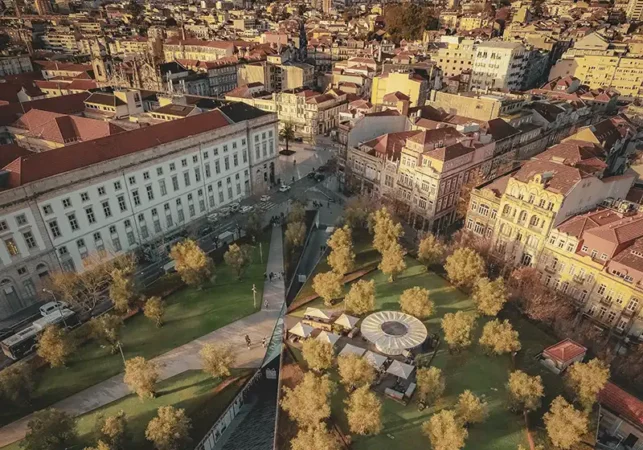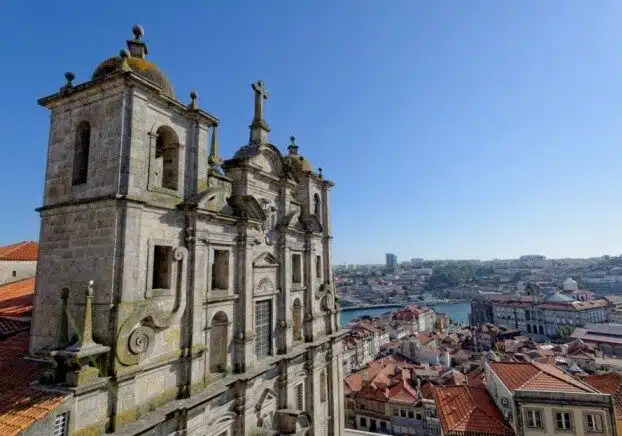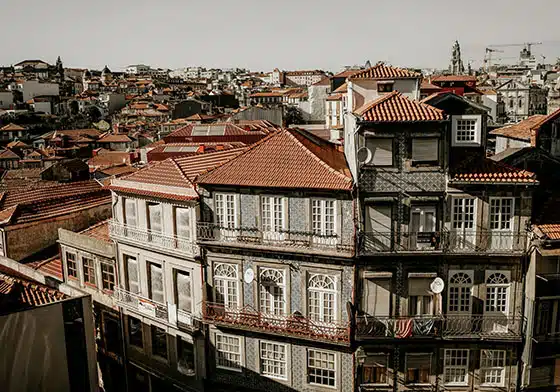Updated: January 30, 2026
Porto real estate investment is a top choice for foreign and local investors, looking to tap into the Portuguese market without spending as much on buying property as they would in Lisbon and other Western European cities like Paris, London, and Madrid.
The Porto real estate market is dynamic, driven by tourism, rental demand, and economic growth, offering strong potential in 2026 for high returns on investment. The Greater Porto region offers excellent rental yields of 5.7-7.2 percent and property values that appreciate every year.
In this detailed guide, Real Estate Investment Porto, we will take a look at the best neighborhoods to invest in real estate in Porto, average property prices, taxes, and the city’s real estate landscape.
Stick around to read about:
Real Estate Investment Porto: Main Takeaways and Quick Facts
- Average property price in Porto: €4,883 in Porto City; €3,937 in Greater Porto Area
- Rental yields: 5.9% in Porto City; 6.6% in Greater Porto Area, higher in Gondomar (7.2%)
- Foreign ownership rules: International buyers can freely invest in Porto, with no restrictions
- Closing time: Usually 1-4 months, depending on the complexity of the purchase
- Buying costs: Typically 7-10% of the property prices (legal fees, taxes, Notary etc.)
- Financing: Non-residents can secure a mortgage, usually with a Loan-to-Value of 60-80%
- Short-term rental rules: Regulated, you will need to get an Alojamento Local (AL) License for short-term rentals
- Top investment neighborhoods: Ribeira, Bonfim, Gondomar Foz do Douro, Campanhã, and the cities of Matosinhos and Vila Nova de Gaia located nearby
Real Estate Investment in Porto
 Porto’s real estate market is expected to continue growing in 2026 and beyond. This year, particularly in the suburbs of Porto on the south side, you will find relatively high returns at a low risk.
Porto’s real estate market is expected to continue growing in 2026 and beyond. This year, particularly in the suburbs of Porto on the south side, you will find relatively high returns at a low risk.
Right now, Porto is a seller’s market, which means there are more buyers than there are properties for sale. You can use this to your advantage – make a real estate investment as soon as possible and then sell it at a higher price.
Average property prices in Porto vary. The average price for properties in the historic center was €5,056 per square meter. Neighborhoods like Campanhã and Paranhos offer more affordable options, at €3,838 and €3,863, respectively.
Porto Real Estate Market Trends
Porto is becoming especially popular with international buyers and expats, thanks to the growing Portuguese economy (GDP growth of 2.1 percent predicted in 2026 according to the European Commission), which is presenting opportunities for real estate investment there.
Northern Portugal, in particular, is leading the way in market growth, with luxury real estate thriving in Porto. International investors are also turning towards sustainability. Porto’s real estate market saw a higher investment rate in green buildings and energy-efficient homes.
Rental yields in the Porto Metropolitan Area are high, with yields for the Greater Porto Area standing at 6.6 percent. There is strong rental demand for rental properties, especially from tourists, students, and digital nomads.
Tourism in Porto and northern Portugal is growing fast. In 2025, total revenue for the north of Portugal exceeded €407 million, clocking an increase of 7.1 percent. Overnight stays in tourist establishments grew by 3 percent and guests by 1.8 percent, both above the national average. This is a positive sign for real estate investments, especially short-term rentals.
In 2026, we expect Matosinhos, Portugal, real estate to increase in popularity as more and more expats take note of this stunning ocean-facing city to the northwest of Porto, making it a location with high investment potential in the future.
Is Porto a good real estate investment right now?
 Investing in real estate in Porto is a smart move in 2026. Porto’s real estate market experienced a significant real estate boom in recent years, due to the influx of tourists, students, digital nomads, and expats.
Investing in real estate in Porto is a smart move in 2026. Porto’s real estate market experienced a significant real estate boom in recent years, due to the influx of tourists, students, digital nomads, and expats.
Here are some of the main benefits of investing in the Porto real estate market:
- Affordable property prices: The real estate market in Porto remains more affordable than Lisbon and the Algarve in 2026. It is also more cost-efficient than some major European cities, such as Berlin, Madrid, and Dublin. Foreign investors can see impressive appreciation on their real estate investment in a short time.
- Strong market performance: Porto’s real estate market is expected to continue growing in 2026 and beyond. This is particularly the case for investors selecting high-end residential units.
- High rental income: Rental yields in the Porto Metropolitan Area are high, with yields for the Greater Porto region standing at 6.6 percent, and the potential for capital appreciation is very strong. Due to strong rental demand, buyers often invest in rental properties in the city’s downtown district, while Gondomar has rental yields of 7.2 percent.
- Different property types: Porto has various types of properties for sale, such as luxury villas, modern apartments, waterfront properties, and traditional houses that would cater to the needs of every buyer. Foreign investors are drawn to this type of diversity and affordable values.
- High quality of life: Porto has a high quality of life. It is a very safe city with reliable healthcare, excellent education, and an affordable cost of living. The city has a growing expat community, making it an ideal location to buy a home or invest in rental properties.
What rental yield can you expect in Porto?
Positive rental yields indicate that foreign investment in real estate in the Porto municipality and the city center can offer a significantly positive Return on Investment (ROI).
Porto Neighborhoods | Rental Yield Percentage |
Gondomar | 7.2 |
Maia | 6.1 |
Matosinhos | 6.3 |
Porto | 5.9 |
Valongo | 5.7 |
Vila Nova de Gaia | 6.2 |
This data is collected from the Portuguese real estate databank, Confidencial Imobiliário.
Short-term rental considerations
- If you are looking to rent out your real estate investment as a short-term rental, you will need to get an Alojamento Local license. To request an AL license, you can do so on the official site of the Portuguese government. Make sure to consult with a lawyer on current short-term restrictions, as some neighborhoods of Porto do not allow you to get an AL license due to market saturation.
- Moderate rent incentive: Under the 2026 State Budget, investors can reduce their Portuguese rental income tax from 25 to 10 percent by opting for the “Moderate Rent” regime, provided the rent is at least 20 percent below the local median market rate.
If you compare investment returns on residential vs commercial properties in Porto, commercial properties tend to offer slightly higher ROI, although residential properties generally provide more stability and consistent demand, and are also less demanding with fewer legal restrictions.
What are the current real estate prices in Porto?
Property prices in Porto have been increasing gradually since 2013, registering a steeper rise in the past five years or so, due to increased interest in foreign investment in Porto real estate.
Porto can now seriously rival Lisbon real estate and many other European cities as one of the best places for foreign investment and to live in. The prices below are from Confidencial Imobilário.
Porto Districts | Price Per Square Meter |
Aldoar, Foz do Douro e Nevogilde | €6,533 |
Bonfim | €5,472 |
Campanhã | €3,838 |
Centro Histórico do Porto | €5,056 |
Lordelo do Ouro e Massarelos | €5,877 |
Paranhos | €3,863 |
Ramalde | €3,626 |
Types of Properties for Sale in Porto
In Porto, you can explore various options for both residential real estate and commercial properties. In the section below in this article on Real Estate Investment Porto, we’ll provide you with more information on some of the most common types of each.
 Houses and luxury villas
Houses and luxury villas
Houses and luxury villas for sale in Porto, Portugal, are often reserved for high-net-worth investors and families who want more privacy, space, and upscale amenities. The most expensive options are waterfront properties, where you can build a private dock, boathouse, or beach.
The luxury real estate market in Porto offers premium prices in neighborhoods where the Douro River meets the Atlantic Ocean, such as at Foz do Douro.
 Modern apartments
Modern apartments
There are various apartments for sale in Porto, Portugal, and they are the most common property type in the city. You can find historic buildings in neighborhoods like Ribeira and Baixa, and modern apartments, usually in residential areas like Boavista and Foz do Douro. Contemporary apartments combine trendy furnishings, while older apartments focus on more historical styles.
 Townhouses
Townhouses
Townhouses are an attractive investment option among remote workers, investors, and families. Foreigners who invest in real estate in Porto, Portugal, often choose the coastal town due to various housing developments that blend history with modern amenities.
 Penthouses and duplexes
Penthouses and duplexes
Penthouses and duplexes are spacious, luxury, high-end properties, often with large balconies and private rooftop terraces. They tend to have beautiful panoramic views of the city, the Atlantic Ocean, and the Douro River.
 Renovation projects
Renovation projects
For investors or buyers with long-term goals, there are plenty of cheap apartments in Porto for sale that they can use to renovate and resell. Upgrading any type of real estate increases its value, which can yield high returns on investment. House flipping of renovation projects can be a smart long-term investment strategy.
 Commercial properties
Commercial properties
The commercial property market in Porto is stable, thanks to Portugal’s economy and thriving tourism sector. Shops and storefronts are a key part of the market, especially in the city’s downtown district.
 Land
Land
While there isn’t much land available for purchase in the city center, there are many plots of land available in the Greater Porto area in urban regeneration zones like Campanhã, Ramalde, and Vila Nova de Gaia. Land investments allow you to build your home exactly as you envision the property, although will take some time to create (three years minimum).
 Quintas
Quintas
A “quinta” in Portugal is a traditional term for a country estate or farm, often with a large, rustic house and a significant plot of land. You can find quintas for sale in the broader Porto District in rural areas and wine regions like the Douro Valley. You can also find some of the best vineyards for sale in Portugal in the north of the country.
Where are the best areas to buy property in Porto?
The best area to invest in property in Porto will depend on your lifestyle, investment goals, and personal preferences. Below, we share some of the best areas to consider.
Gondomar
Gondomar remains a popular residential area outside the Porto city center. It offers more affordable property prices, which can be convenient for international investors who are priced out of central Porto and are looking for a better return.
- Rental yield: 7.2 percent
Maia
Maia is an industrialized urban area with a dynamic business environment. The neighborhood remains an attractive option for local and international investors and looks poised to grow further in 2026.
- Rental yield: 6.1 percent
Matosinhos
Those who seek to buy property in Porto often choose Matosinhos due to the strong rental yields and lifestyle benefits. This city, to the northwest of Porto, has access to beaches and a mix of residential and commercial properties with high rental income. Matosinhos is also a top location to invest in luxury property.
- Rental yield: 6.3 percent
Porto
The city of Porto itself has a lower rental yield compared to some of its suburbs, but remains one of the best Western European cities for investors to place their money. This is due to the influx of tourists, young professionals, and access to modern amenities; the Porto city center continues to offer the potential for exceptional returns on real estate investments.
- Rental yield: 5.9 percent
Valongo
Valongo is another municipality in the Porto Metropolitan Area with affordable housing. Average rental yields are quite high, which shows a healthy rental market, and you will likely get more for your money by purchasing property here.
- Rental yield: 5.7 percent
Vila Nova de Gaia
Vila Nova de Gaia is a popular investment location located just across the Douro River. It offers more competitive prices than Porto and has high rental yields. The luxury property market is taking off here, with Gaia also becoming a firm favorite with families seeking more space close to Porto.
- Rental yield: 6.2 percent
Where to find property in Porto?
You can find properties in Porto on online real estate portals, although there is no Zillow Portugal as you will find in the USA. While it is important to begin with research, the best way to find the most promising opportunities in 2026 is to work with seasoned professionals.
If you are looking for off-market properties, a buyer’s agent like Goldcrest can help. Buyer’s agents work exclusively for the buyer. We constantly research Portugal’s real estate market and find the best properties that can suit your budget and goals.
How to choose the best neighborhood for your Porto investment goals in 2026?
- Affordable properties with strong rental yields:There are many houses for sale in Porto in more affordable neighborhoods like Gondomar, Ramalde, and Campanhã. Foreign investors often choose these locations for their real estate investment when they want more affordable living costs, while also having all the modern amenities.
- Luxury properties: If you are seeking a more high-end investment, then luxury villas, vacation homes, retreats, and penthouses can be an excellent choice. Luxury real estate for sale in Porto is often available in neighborhoods such as Foz do Douro and Marechal.
- New prime areas: Foz do Douro is one of the most privileged locations in Porto, with stunning views of the Atlantic Ocean. While Vila Nova De Gaia has a growing luxury real estate market, especially alongside the riverfront, it has more affordable property prices than the exclusive villas you can find in Foz do Douro.
An experienced real estate agent in Porto, like a local buyer’s agent, can provide invaluable insights and discuss your options with you. One of the top real estate agencies specializing in Porto investment properties is Goldcrest, which has local representation in the city.
Alongside working with a real estate expert and a lawyer, it can be worth seeking out a surveyor to conduct structural checks on the property. To find out more about top-rated property inspection services for Porto real estate buyers, check out our article: Property Surveyor Portugal.
You can discover more about finding your dream home in our guide: Property Finder Portugal.
Step-by-Step Porto Real Estate Investment Process
To invest in real estate in Porto, the table below provides a simple step-by-step guide.
Step | Description | |
Step 1: Secure financing for your property | Assess your finances, explore mortgage options from Portuguese banks, and understand associated costs such as taxes, legal fees, and property registration expenses. | |
Step 2: Find the perfect property | Set a budget and research the Portuguese real estate market, focusing on location, amenities, and rental potential. Seek guidance from real estate professionals like buyer's agents or real estate agents. | |
Step 3: Make an offer | Once you find a suitable property, negotiate an offer with the seller, potentially facilitated by a real estate professional. Consider having a buyer's agent representing your best interests during negotiations. | |
Step 4: Reservation Agreement and CPCV | After an offer is accepted, a Reservation Agreement may require a refundable fee. The Promissory Contract (CPCV) formalizes the promise of acquiring real estate between parties at a future date under pre-defined conditions and includes a deposit to secure the transaction. We recommend that the signing of the CPCV is done in front of a Notary. | |
Step 5: Signing the Escritura | The Escritura, or Final Deed, officially transfers property ownership. Signed before a Notary, it involves paying remaining balances and fees. After signing, the buyer becomes the official owner, concluding the process. | |
Note that the steps to complete a property purchase remotely in Porto are largely the same, and property agents can check properties on your behalf and offer video footage. You can also give your lawyer Power of Attorney (POA) to sign on your behalf.
What taxes should investors budget for?
When investing in real estate in Portugal, you will need to take into account property taxes, which fall at the time of purchase and on an annual basis.
Property taxes at the time of purchase
- Property Transfer Tax (IMT) is a municipal tax levied during the purchase and ranges from 0 to 8 percent, depending on the property price, location, type of property, and intended use. A fixed tax rate of 10 percent applies if the buyer is linked to blacklisted jurisdictions.
- Stamp Duty of 0.8 percent
You will also need to account for Notary fees at the time of purchase, which usually range between €500 and €1,000. You can pay these fees at the local tax office before you sign the purchase deed.
Property taxes to be paid annually
- Immovable Property Tax (IMI) ranges from 0.3 percent to 0.45 percent of the property’s total value (up to 0.5 percent in certain situations) for urban properties and 0.8 percent for rural buildings.
- Properties valued over €600,000 incur the Additional IMI (AIMI), with specific tax rates ranging from 0.7 to 1.5 percent depending on the property’s value.
A fiscal representative can act as your liaison and make sure you’ve filed, received, and paid your property taxes on time. A specialized real estate lawyer in Porto can help you navigate through the legal complexities and identify any risks or issues before property acquisition.
How to finance your real estate purchase in Porto?
You can finance your property purchase with a Portuguese mortgage, which you can acquire from a bank or a mortgage broker. Some international banks, especially those with branches in Portugal, may offer mortgages to foreign buyers. We recommend exploring your financing options as early as possible.
Portuguese banks are open to lending to foreign nationals. For non-residents, banks tend to lend between 60 percent and 80 percent of the property’s value, which means you will need a down payment of at least 20 percent to 40 percent. Portugal has fixed, mixed, and variable mortgage rates.
Required documents
 You will need to have the following documents to invest in real estate in Portugal:
You will need to have the following documents to invest in real estate in Portugal:
- A Portuguese Tax Identification Number (NIF)
- Proof of identity (Passport or photo ID)
- Proof of income (pay slips, tax returns)
- Contrato Promessa de Compra e Venda (CPCV
- Imposto de Selo: Proof of the Stamp Duty payment
- Caderneta Predial: A land registry document that contains information about the property, including its location, boundaries, and the owner
You can find out more in our guide to mortgages in Portugal.
Visa Options to Live in Porto
If you are seeking to relocate to Porto and are not just seeking the city out as a property investment, there are many residency visa options on the table. Visa and residency benefits include EU and Schengen access.
Below, in this article on Real Estate Investment Porto, we share two of the most popular options.
 D7 Visa (Retirement Visa)
D7 Visa (Retirement Visa)
The Portugal D7 Visa, also known as the Passive Income Visa or Retirement Visa, is a residency visa designed for non-EU/EEA/Swiss citizens who want to live in Portugal and can demonstrate a stable, regular passive income of at least €870 per month as of 2025. They also need a Portuguese bank account with a minimum balance of €10,440 for a single applicant, with savings that increase for each dependent family member.
Porto is an excellent city to retire to, with a range of retirement homes in Porto, Portugal.
 Portugal Golden Visa
Portugal Golden Visa
Portugal’s Golden Visa program allows non-EU citizens to get residency by making certain investments, like creating jobs or funding cultural projects. Although investing in real estate doesn’t make you a permanent resident (PR), the Golden Visa can lead to a PR status or citizenship after five years, even if you only spend a short time in Portugal each year. This makes it a useful option for real estate investors looking for long-term rental opportunities.
Note: There is a proposed law to increase the time to apply for Portuguese citizenship from five to ten years (and seven years for CPLP nationals). You can find out about the latest developments in our Portugal Nationality Law article.
Porto vs Other European Cities: 2026 Comparison
For investors, comparing different cities can give a clearer picture of what each offers in terms of investment to make the best decision. Below, we compare Porto with three other key Southern European cities.
City | Average price per square meter | Rental yield |
Porto | €3,937 - €4,883 | 5.9% (6.6 in Greater Porto) |
Lisbon | €4,935 - €5,040 | 5.2% (6.8 in Greater Lisbon) |
Barcelona | €4,750 - €5,150 | 5.4% |
Athens | €2,400 - €2,900 | 4.4% |
Property prices will vary depending on the location in the city and the property type. This data is taken from the latest 2026 data from Confidencial Imobiliário, Investopedia, and the Global Property Guide.
Real Estate Investment Porto: US Investor Considerations
 For US nationals considering investing in Porto’s property market, below we provide key tips to ensure a straightforward acquisition process.
For US nationals considering investing in Porto’s property market, below we provide key tips to ensure a straightforward acquisition process.
- Financing: Portuguese banks generally offer an LTV of 60-80 percent, with popular options being Millennium BCP and Novo Banco.
- Tax Treaty: The US-Portugal Tax Treaty protects Americans from being taxed twice on the same income. Speak with a tax accountant to optimize your tax affairs if moving your tax residency status to Portugal.
- Exchange restrictions: Property located outside the USA is not considered to be US real property, meaning that capital gains from the sale of a US property cannot be deferred through a 1031 exchange when reinvesting in Portuguese real estate.
- Mandatory IRS reporting for US investors: To avoid financial penalties, US taxpayers with assets in Portugal may be required to file the FBAR (FinCEN Form 114), which is required if the combined value of all foreign financial accounts exceeds $10,000 at any point in the year. They will also need to file Form 8938 (FATCA), which is required if specified foreign financial assets exceed $50,000 for single filers who live in the USA (higher thresholds if living abroad).
- Currency exchange: To protect yourself from international transfer fees and to make payments in Portugal easier, open a bank account in Portugal.
Sample case study: Five-year investment strategy
Below is an example case study for an investment in a high-growth area in Porto. This is dependent on property type, market location, and future demand.
Investment Phase | Details | Value (USD) |
Initial investment | Your total "out-of-pocket" cost (down payment + closing fees). | $100,000 |
Property purchase price | Renovated 1-Bed (T1) in Bonfim or Campanhã | $235,000 |
Net rental profit | 5-year total cash flow (after 10% Moderate Rent tax) | $51,000 |
Net asset appreciation | Around 6% annual growth minus 2026 Capital Gains Tax. | $67,500 |
Total net ROI (Gains) | The new wealth generated (rent + capital appreciation). | $118,500 |
Total exit value | Total walk-away cash (initial capital + all profits). | $218,500 |
The total rental profit would be $51,000 (cumulative net cash flow over 60 months – gross rent collected minus operating expenses), with asset appreciation of around $79,5000 between 2031 and 2026.
How much money will you make? Total Net ROI (Gains): $118,500 profit (appreciation + rent – taxes)
How much money will you get back when you sell? Total Capital (The “Exit Value”): $218,500 (total profit + initial investment.
Note: This case study is for long-term rentals. Should investors opt for short-term rentals, this can generate higher rental yields of as much as 15-35 percent in Porto’s tourist-heavy areas. Bear in mind, however, the taxes, regulations, and hands-on management that come with the territory of short-term rentals.
- Choose long term rentals for passive income, that offers better tax advantages
- Choose short term rentals for maximizing gross cash flow and have a property in a non-restricted zone
Goldcrest: How We Can Help You
Goldcrest is a buyer’s agent that is based in Lisbon. We provide expert, impartial advice on real estate investments and how to buy property in Portugal. From scouting out the perfect property through to property acquisition, we have you covered throughout the process.
If you are looking to purchase property in Portugal, don’t hesitate to get in touch. Our team of skilled experts is available to solve all your real estate doubts, helping you with the property search and offering insightful expertise and strategic advice.
Why choose Goldcrest?
- Local knowledge: With offices located across Portugal, our presence nationwide allows us to assist you personally across the country.
- Independent service: As an independent buying agent, we do not represent any development or project. Our service is entirely tailored toward each individual client, providing you with everything you need to secure the perfect property at the best possible price. As an impartial advisor on the market, we work solely on behalf of our client and provide a service tailored to your needs and requirements.
- Streamlined process: Our real estate agents speak English and Portuguese, and our service is completely focused on providing you with a hassle-free buying experience, saving you time.
- Experienced team: Our expert real estate team has a vast local knowledge of the Portuguese property market. We have cutting-edge technology and metasearch tools at your disposal to provide full market coverage, ensuring the best investment choices and negotiated prices.
- Network of partners: We have a close network of partners, including lawyers, property management services, builders, architects, designers, and landscape gardeners, again saving you time and hassle by providing you with trusted experts in their field of work.
Frequently Asked Questions About Porto Real Estate Investment
Is Porto real estate a good investment?
Porto is a great place to invest in real estate in 2026 because of its strong rental demand for long and short-term rentals. This coastal city is more affordable than Lisbon and many Western European cities, and its high rental yields attract international buyers.
How much do I need to invest in real estate in Porto?
Property prices in Porto vary significantly by neighborhood and type. The average price per square meter can range from €3,626 to €6,533. Porto districts like Ramalde and Paranhos are more affordable for real estate investment, while Aldoar, Foz do Douro, and Nevogilde cost more.
Can a US citizen invest in real estate in Porto?
Yes, Americans can buy any kind of real estate in Porto, whether a house, an apartment, a luxury villa, or a commercial building. The country has no restrictions on foreigners investing in real estate in Portugal. You only need a Portuguese tax number (NIF) to finish your transaction.
Where to find a cheap house for sale in Porto, Portugal?
To find a cheap house in Porto, focus on neighborhoods like Campanhã, Paranhos, Ramalde, and Bonfim, which are more affordable than the city center. You can search for real estate listings on popular Portuguese real estate sites like Idealista and filter them by price.
Where are the best areas for short-term rental properties?
The best areas in Porto for short-term rentals are neighborhoods and districts with many tourists. The Historic City Center, Baixa, and Bonfim attract young professionals, digital nomads, and property owners.
How much does real estate investments cost in downtown Porto?
Property prices in Porto’s city center are about €5,056 per square meter, which varies for every location and type of property. Neighborhoods like Bonfim can sell properties for €5,472 per square meter.
What are the legal services for foreign real estate investors in Porto?
Legal services for international real estate investors can cover:
- Due diligence
- Drafting and reviewing contracts
- Getting your NIF
- Legal and tax guidance
- Property registration
- Legal representation on your behalf, if required (Power of Attorney)
- Ensuring correct documentation
How to evaluate short-term rental income potential in Porto properties?
When evaluating short-term rental income opportunities in Porto, consider:
- Location (future growth, tourist footfall)
- Demand (seasonal peaks or stable)
- Competition (occupancy rates, price comparisons)
- Regulations (AL license)
- Investment (ROI, capital appreciation potential)
- Financials (costs and fees)
We recommend working with real estate agencies, such as a buyer’s agent, to help identify promising opportunities in Porto with strong ROI and future growth potential.

